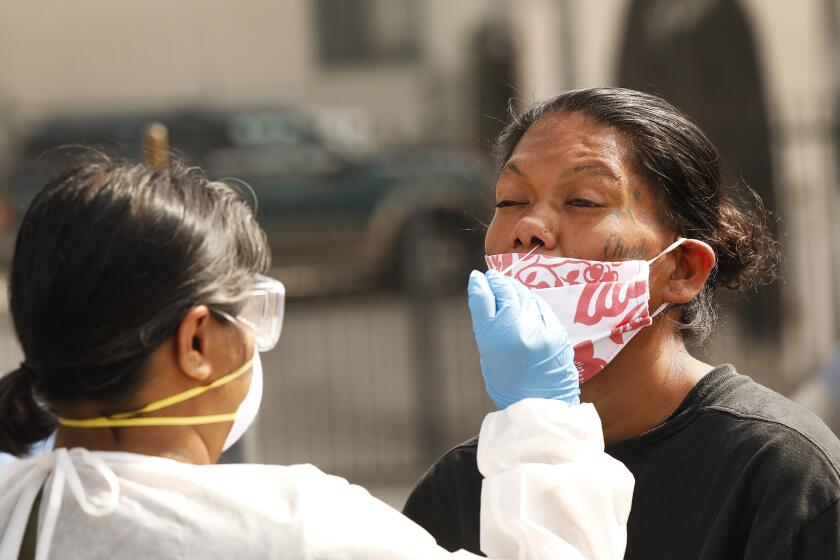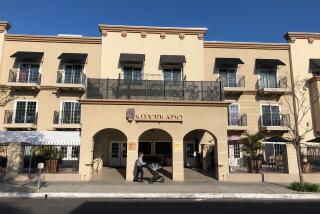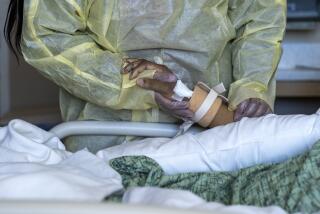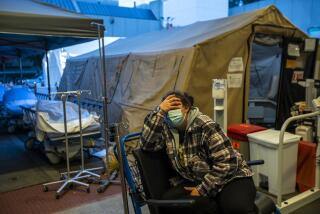A nurse without an N95 mask raced in to treat a ‘code blue’ patient. She died 14 days later
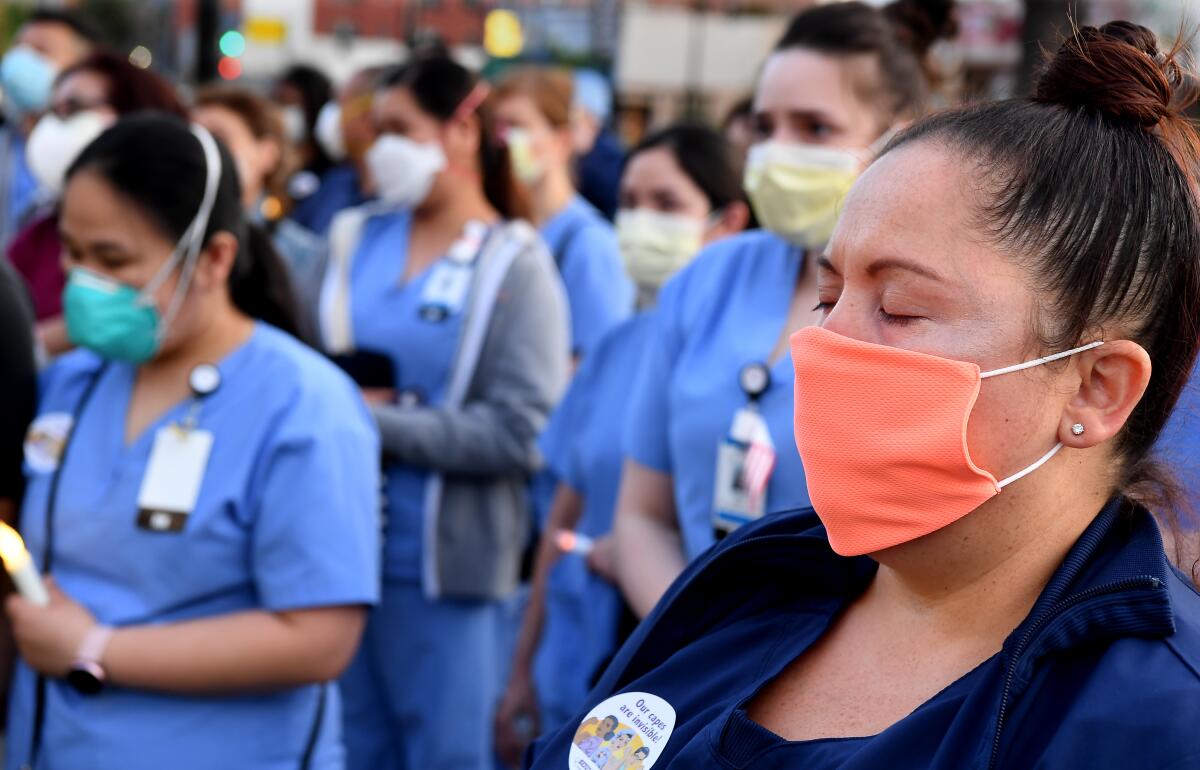
- Share via
The decision that Celia Marcos made, the one that would ultimately steal years from her life, had been hard-wired after decades working as a nurse.
On the ward that she oversaw at Hollywood Presbyterian Medical Center, a man with COVID-19 had stopped breathing. Marcos’ face was covered only with a thin surgical mask, and obtaining a more protective N95 mask before entering his room would have wasted valuable time, her colleagues say.
The 61-year-old charge nurse knew the chest compressions and other breathing treatments the patient needed would likely spew dangerous virus particles into the air that could land on her face and clothing. She would be at high risk of catching the coronavirus.
Marcos raced into the room. Fourteen days later, she was dead.
Marcos died in the same hospital where she had worked for more than 16 years, one of at least 36 healthcare workers in California who have succumbed to COVID-19.
In one version of her story, she is a selfless caregiver who chose her patient’s life over her own by rushing into his room without an N95. But staff at Hollywood Presbyterian say the reality is much bleaker.
As charge nurse, Marcos was required to respond to patients who stopped breathing, but she wasn’t provided an N95 mask at the beginning of her shift, her coworkers say. The masks are scarce, and staff who do get them are often asked to reuse them over multiple days, they said.
“The hospital wasn’t giving us appropriate PPE — the N95s were locked,” said one nurse, who, like others, spoke on the condition of anonymity after expressing fear of retaliation from hospital administrators. “It’s just too painful for everybody, what happened to her.”
Though all front-line workers are vulnerable to the coronavirus, Marcos’ death illustrates the way that risk has been amplified by a national shortage of personal protective equipment. Such exposures have been cataloged at hospitals across California.
“I was the one right in front of his face,” Marcos wrote in a text to her niece reviewed by The Times. Concerned she had been infected, Marcos put hand sanitizer in her hair after leaving the patient’s room, and showered as soon as she got home, she said in the message.
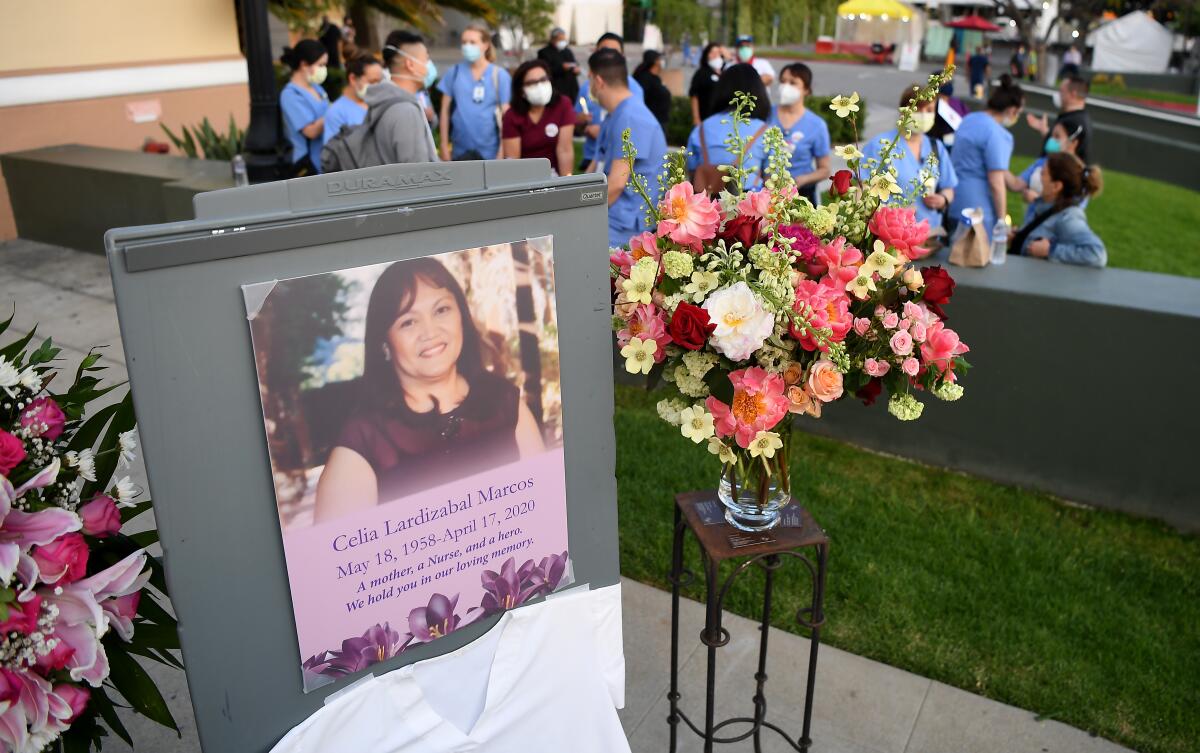
Hollywood Presbyterian officials denied that Marcos treated COVID patients without proper protective gear and said the hospital adheres to all local and federal recommendations. “Despite these efforts, and our commitment to following all guidelines, we still lost one of our own to this terrible virus, and we feel this loss very deeply,” administrators said in a statement to The Times.
The nurses union SEIU 121RN filed a complaint with the state Occupational Safety and Health Administration that called Marcos’ death “the result of inadequate PPE provided to staff.” The union also alleged in a separate complaint to the state health department that Marcos received substandard treatment once she became a patient at the hospital.
Lying in her hospital bed, surrounded by colleagues who had become her caretakers, one of the last things Marcos said was: “I don’t want to die.”
*
Marcos began working at Hollywood Presbyterian in 2004, three years after immigrating to the U.S. with her family. Back home in the Philippines, she had trained to be a nurse, her longtime dream, according to her sons.
At the Los Angeles hospital, she was known for her sweet nature and ability to heal rifts and remain cool-headed, no matter the situation. Filipino colleagues called her “ate” — big sister in Tagalog.
“She’s the type of person who in an emergency you can really count on,” said another colleague, who also asked for anonymity for fear of retaliation. “She’s the calm that we can look to in order to get through.”
On the night of April 3, Marcos was asked to put those skills to use.
A man admitted on her floor with COVID-19 had been complaining that he wanted to go home because he didn’t feel sick. Two hours later, he stopped breathing, Marcos wrote in a text to her niece Andrea Gian Lardizabal, who works as a nurse in the Philippines.
Even as Mayor Eric Garcetti has extended testing to everyone in L.A. County, doing the same for homeless people has proved to be far more challenging.
Marcos worked on a ward that took coronavirus patients when the COVID units were full. Because her floor wasn’t primarily for COVID patients, N95s weren’t regularly given to staff, and instead preserved for those treating COVID patients, staff say.
Sydnie Boylan, another charge nurse, initially worked on Marcos’ floor but worried about the lack of protective gear. She switched to the COVID unit “because that’s where the PPE is,” she said. “Even if we don’t have enough, we have more than everybody else.”
With only a surgical mask, Marcos stayed in the patient’s room for at least 30 minutes while he was resuscitated and eventually placed on a ventilator to help him breathe, before being moved to the ICU, her colleagues say. Marcos strapped an oxygen mask on the patient, who had “almost died,” she told her niece in a text message.
“Celia was called to a COVID-19 isolation room while wearing only a surgical mask — not the required N95 respirator, gown, face shield, and booties that her hospital should have given her for her protection,” said SEIU 121RN President Nina Wells said in a statement to the Times. “Now we know she gave her life to try to save a life.”
Hospital officials dispute that Marcos, or any staff members, were under-equipped. They did not say if Marcos wore an N95 mask that day, but said that nurses responding to “code blues” are provided with them. A hospital investigation determined Marcos did not have “unprotected exposure to COVID-19 at the hospital,” they said.
The discrepancy may be due to a recent change in CDC guidelines around the coronavirus. Early in the pandemic, the agency recommended that N95 masks were needed for treating all suspected COVID-19 patients, but amid a severe shortage of gear, switched to recommending the masks only for high-risk procedures.
The rules have created a gray area that allows hospitals to instruct staff that in most cases, surgical masks are all that is needed to protect them from the coronavirus, nurses say.
“Imagine you get inside the room just wearing those. Do you feel protected?” said one COVID-19 nurse at Hollywood Presbyterian, who added that she had been repeatedly told she didn’t need an N95 for most patient visits. “I don’t trust the CDC anymore.”
Hospital staff said they did not blame Hollywood Presbyterian, but viewed the facility as a victim of national shortages. At St. John’s Health Center in Santa Monica, supervisors did not provide N95s to some nurses treating COVID-19 patients last month and the nurses refused to enter the rooms.
“I don’t think my hospital is worse than anyone else’s hospital,” Boylan said. “I don’t know who threw out the rule book when it comes to infection control.”
Marcos’ experience on April 3 seemed to rattle her. In a text message to Lardizabal, Marcos described the patient’s rapid deterioration and warned the younger woman to stay home and wash her hands.
“No wonder a lot of covid patients get intubated and some die in just a few days,” she wrote in a text. “Pls be extra careful.”
*
Marcos began feeling sick three days after she treated the man with COVID. She told her niece that she was doing steam inhalation twice a day as a preventive measure.
But on April 11, she told her oldest son, Donald Jay Marcos, that she had a headache and difficulty breathing. He urged her to see a doctor.
Before the pandemic, Marcos and her two sons had planned a trip to the Philippines for last month. Marcos loved to travel to new places, but spent most of her savings visiting her family.
Sign up for our free Coronavirus Today newsletter
We’ll bring you the latest news, our best stories and what they mean for you — plus answer your burning COVID-19 questions.
Donald, 41, didn’t hear from his mother again until April 15, when she answered his video call from her hospital bed. She told him she had developed pneumonia in both lungs.
Her labored breathing made it difficult for her to talk, Donald recalled. Through their screens, the two watched each other cry.
Marcos had no health conditions other than high blood pressure, which she controlled with medication. She was healthy, vibrant and lived with her partner, who is also a nurse, her son said.
On April 17, Marcos’ heart stopped repeatedly, requiring staff to resuscitate her multiple times. News of her rapid deterioration spread through the hospital. A colleague received a call that Marcos was crashing.
“I said, ‘Don’t ever say that to me,’” and I was crying,” said the nurse. “I was like, ‘Don’t ever say that to me.’”
Some have suggested there were problems with Marcos’ care and that some staff were scared to treat her for fear of catching the virus themselves.
In a complaint filed last week with the state health department, representatives from SEIU 121RN said that nurses who took care of Marcos said a doctor refused to provide necessary care, including intubation to help her breathe, “prior to her ultimate demise from COVID19,” according to documents reviewed by The Times.
Hospital administrators said they could not comment due to patient privacy laws, but added that their “goal is to provide excellent care to all of our patients.” The doctor could not be reached for comment.
In the waning daylight Wednesday, staff filtered out of Hollywood Presbyterian in scrubs and masks to pay tribute to Marcos at a vigil outside the facility’s entrance. Despite social distancing recommendations, nurses packed in to watch the ceremony, saying that inside the hospital, they are always close together.
At the beginning of the first shift without Marcos, on April 20, the administration gathered the nurses on her floor to say a prayer for her. The gesture was a painful reminder of her absence, said one nurse.
“It’s difficult to even fathom that Celia is gone,” the nurse said. “I still think of her as being on vacation. It is easier than having to lose someone.”
The death has made waves at the hospital. Another nurse who treats COVID-19 patients said staff members began demanding better protections after Marcos’ death. Some have have refused to work without proper gear, she said.
Supervisors are providing more PPE and staffers are no longer reprimanded for bringing their from home, the nurse said. She added that they will continue to fight for more safeguards.
“I love my job, but I’m not trying to die a hero,” she said.
Help the Los Angeles Times reimagine what California should look like after the COVID-19 pandemic ends.
More to Read
Sign up for Essential California
The most important California stories and recommendations in your inbox every morning.
You may occasionally receive promotional content from the Los Angeles Times.
